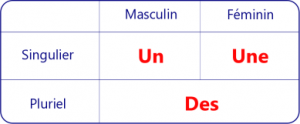Difference between revisions of "Language/French/Grammar/Indefinite-article"
Jump to navigation
Jump to search
m (Quick edit) |
m (Quick edit) |
||
| Line 83: | Line 83: | ||
===Un Une Des - French Indefinite Articles // French Grammar Course ...=== | ===Un Une Des - French Indefinite Articles // French Grammar Course ...=== | ||
<youtube>https://www.youtube.com/watch?v=DSiG8mYiwkI</youtube> | <youtube>https://www.youtube.com/watch?v=DSiG8mYiwkI</youtube> | ||
==Related Lessons== | |||
* [[Language/French/Grammar/Demonstrative-pronouns-with-—ci-and-—là|Demonstrative pronouns with —ci and —là]] | |||
* [[Language/French/Grammar/Compound-adjectives-involving-demi—,-nu—-and-mi—|Compound adjectives involving demi—, nu— and mi—]] | |||
* [[Language/French/Grammar/Pronominal-verbs-and-body-parts|Pronominal verbs and body parts]] | |||
* [[Language/French/Grammar/Gender|Gender]] | |||
* [[Language/French/Grammar/Invariable-adjectives|Invariable adjectives]] | |||
* [[Language/French/Grammar/An-adjective-agreeing-with-nouns-linked-by-de|An adjective agreeing with nouns linked by de]] | |||
* [[Language/French/Grammar/Location-of-adverbs-modifying-verb-phrases|Location of adverbs modifying verb phrases]] | |||
* [[Language/French/Grammar/Indefinite-and-negative-noun-phrases-with-adjective-complements|Indefinite and negative noun phrases with adjective complements]] | |||
* [[Language/French/Grammar/Use-of-en|Use of en]] | |||
* [[Language/French/Grammar/Adverbs-ending-in-—ment-derived-from-the-masculine-form-of-an-adjective|Adverbs ending in —ment derived from the masculine form of an adjective]] | |||
* [[Language/French/Grammar/An-adjective-agreeing-with-nouns-linked-by-et,-ou-or-ni|An adjective agreeing with nouns linked by et, ou or ni]] | |||
* [[Language/French/Grammar/Direct-object-quantifiers-and-«-en-»|Direct object quantifiers and « en »]] | |||
* [[Language/French/Grammar/Use-of-il,-ce,-cela-and-ça-as-impersonal-pronouns|Use of il, ce, cela and ça as impersonal pronouns]] | |||
* [[Language/French/Grammar/Nouns-with-irregular-plurals|Nouns with irregular plurals]] | |||
* [[Language/French/Grammar/Singular-or-plural-when-a-number-of-individuals-have-one-item-each|Singular or plural when a number of individuals have one item each]] | |||
Revision as of 12:52, 26 February 2023
Indefinite article in French
French Articles
French has 3 kinds of articles:
- Definite articles
- Indefinite articles
- Partitive articles
The table below summarizes the different forms:
| French Articles | |||
|---|---|---|---|
| Definite article | Indefinite article | Partitive | |
| masculine | le | un | du |
| feminine | la | une | de la |
| in front of a vowel | l' | un/une | de l' |
| plural | les | des | des |
Indefinite Article : Rule & Examples
In French, nouns are almost always preceded by an article or a determiner. This indicates the gender of the noun (masculine or feminine) and its number (singular or plural).
We use the indefinite articles (articles indéfinis) in the following cases:
To talk about something non-specific:
- Céline est une copine de Noémie. (one of many)
Céline is a friend of Noémie. (one of many)
To mention something for the first time in a text:
- Jean a acheté une moto.
Jean bought a motorbike.
In can be translated by “a” or “an” in English.
Video - French Indefinite Article / How to say “a” or “an” in French
Learn how to say “a” or “an” in French
- Similar lessons : Definite article & Indefinite article
- More on this subject: Typical use of the indefinite article
Videos
French Definite and Indefinite Articles - YouTube
Learn French Indefinite Articles for Beginners - YouTube
French indefinite Article (French Essentials Lesson 8) - YouTube
FRENCH ARTICLES - DEFINITE INDEFINITE & PARTITIVE ...
Un Une Des - French Indefinite Articles // French Grammar Course ...
Related Lessons
- Demonstrative pronouns with —ci and —là
- Compound adjectives involving demi—, nu— and mi—
- Pronominal verbs and body parts
- Gender
- Invariable adjectives
- An adjective agreeing with nouns linked by de
- Location of adverbs modifying verb phrases
- Indefinite and negative noun phrases with adjective complements
- Use of en
- Adverbs ending in —ment derived from the masculine form of an adjective
- An adjective agreeing with nouns linked by et, ou or ni
- Direct object quantifiers and « en »
- Use of il, ce, cela and ça as impersonal pronouns
- Nouns with irregular plurals
- Singular or plural when a number of individuals have one item each

